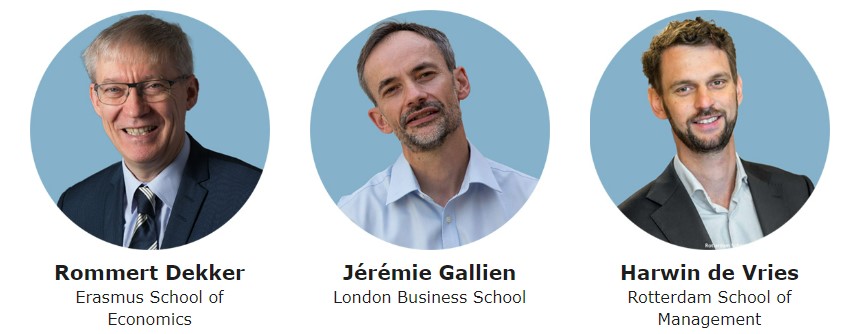Netherlands OML Conference 2024
Keynote speakers


My academic journey; ups and downs, lessons learned, decisions made
In this presentation we sketch the history and development of the field of reverse logistics, which is the process of recapturing value out of discarded or returned goods. We approach the field from both the business as well as the scientific side.
The field started somewhere in the nineties of the last century when companies realized there is value to be recovered from returned or discarded goods. Before that time returns were seen as a necessary evil and no professional services were available. At the same time academics interacting with those companies, started investigating the effects of returns on the scientific models in various business processes.
In production planning and inventory control, returned items which could be reused, served as a special second sourcing method, though one with much uncertainty. Pull and push policies were compared with each other. In inventory control it meant that inventories could increase instead of always decreasing and models had to be adapted to take care of that. For instance, inventory positions were suddenly unbounded. Returns also had an impact on network design for recovery facilities, as the streams were subject to much more uncertainty. Comparisons and difference with waste management were established. Apart from these classical OR topics, academics also investigated strategic business aspects of reverse logistics, leading to closed-loop supply chain models. High level models were developed assisting companies to decide on various aspects. For example whether or not to offer free returns, whether to engage in remanufacturing or recycling, etc. Recently much attention is being paid to the many returns in e-commerce.
Apart from sketching my own role in this field, I also evaluate my research strategy and decisions made.

Practice-Based Research on Global Health Delivery
As part of this talk I will share my perspective on practice-based operations management research on global health delivery, drawing upon my experience with the following projects: distribution of essential medicines in Zambia, location of HIV early infant testing laboratories in Mozambique, deployment of community health workers in Ghana and operational management of maternity homes in Liberia.

Humanitarian Logistics: Organizing Chaos in Humanitarian Crises
Recent decades have witnessed many major humanitarian crises, ranging from natural disasters like the Turkey-Syria earthquake, hurricane Katrina, and the Indian Ocean tsunami, to complex emergencies such as the Syrian civil war and the Ukraine crisis, and epidemics such as Ebola. Climate change, population growth, and rapid urbanization will likely further increase their frequency and impact. This underscores the increasing importance of humanitarian logistics – the set of supply chain management activities that are necessary to prepare for, respond to, and recover from humanitarian crises. These activities, the context and stakeholder landscape in which they take place, and the objectives are often of a fundamentally different nature than their commercial sector counterparts. In this talk, we discuss the increasing relevance of the field of humanitarian logistics, key differences with commercial sector logistics, and the crucial importance of logistics preparedness, using examples from research projects on process modularity (with Doctors Without Borders), staging hub networks (Ukraine response), and localization.
Netherlands OML Conference 2024
 Registration website for Netherlands OML Conference 2024
Registration website for Netherlands OML Conference 2024Netherlands OML Conference 2024reservations@tue.nl
Netherlands OML Conference 2024reservations@tue.nlhttps://www.aanmelder.nl/nomlc2024?version=latest
2024-05-30
2024-05-31
OfflineEventAttendanceMode
EventScheduled
Netherlands OML Conference 2024Netherlands OML Conference 20240.00EUROnlineOnly2019-01-01T00:00:00Z
To be announcedTo be announcedevent registration made easy
aanmelder.nl is the software partner for events.
Click here to discover the software.